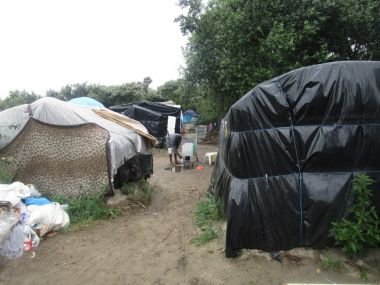Songs of Praise in Calais: Finally the media listens to migrants themselves
Hardly known for its radical gestures, Songs of Praise this morning became the subject of celebration and criticism. The well-loved, and some would say innocuous Sunday tea-time BBC programme will be broadcast on location from a church. So far. So normal. But this isn't just any church. It's the church at the heart of the migrant encampment in Calais.
"Songs of Praise from 'the JUNGLE' migrant camp: Fury as BBC to film in CALAIS" fulminated the Express. The Mail and the Sun responded with predictable alacrity – as two of their biggest bête noirs, immigrants and the BBC came together.
It would be easy to turn this into yet another story bashing the right-wing tabloids for their heartless agenda. It would be easy to lionise the BBC. But that's a sideshow. Surely it's more important to think about why so many of us were heartened to think that dear old Auntie Beeb was taking a risk by broadcasting one of its 'safer' programmes from heart of a heart-breaking situation.
And really, it's quite simple. We're moved because the camp, comprised of some 5,000 souls, is on our doorstep. We're moved because many of these people aren't simply 'migrants,' they're refugees who have fled hell and high water to gather in Calais and attempt to enter the UK. We're moved because we realise that there but for the grace of God go all of us.
Maybe it's the church, which has been erected in the heart of the camp that makes us stop and think that these people aren't a swarm, a problem to be solved or a points scoring device for the tabloid press. They are made in the image of God. They are fearfully and wonderfully made. They may indeed be angels.
Too often though, we allow the TV news coverage, headlines in the press and the second hand reports filtered through politicians and authorities to determine our view of the people themselves. But what have they to say for themselves? Filmmaker Jaz O'Hara has visited the camp to speak to residents. In a viral Facebook post she says of a 23-year-old from Darfur, "Crying, he told me that every time he closes his eyes, he sees his mother, telling him he is a good boy, and that he is doing the right thing. [He asks] 'Why then, am I living like an animal?'"
Save the Children, which has admirably led the campaign on restarting the rescue boats in the Mediterranean, says we're at risk of ignoring these stories. Chief Executive Justin Forsyth told the Guardian, "That's what motivates the mums and dads who encourage their children to flee violence and suffering knowing they face horrific journeys across deserts, seas, borders and barbed wire fences – to reach safety. Not greed, not opportunism, but love." We'll doubtless hear more of the stories from the mouths of the people in the camp on Songs of Praise, rather than others talking about them – and it's about time.
None of this is to say that we don't need to apply rules or to think carefully about our response and this isn't an appeal for an open door policy to our borders. But it is all call to think of those in the camp as people with hopes, dreams and ambitions, some of whom are sisters and brothers in Christ, all of whom are human beings.

The Bible is clear about how we should be treating those who are fleeing danger, persecution and war. There are numerous biblical injunctions as to how we should treat the alien, along the lines of Deuteronomy 27:19, "Cursed be anyone who deprives the alien, the orphan, and the widow of justice." Pretty unequivocal.
The great conservative philosopher Edmund Burke advised his fellow men and women that to "Love the little platoon we belong to in society, is the first principle (the germ as it were) of public affections. It is the first link in the series by which we proceed towards a love to our country, and to mankind."
This principle at first glance may seem to preclude specific care for those in the camp in Calais. After all, they're in France, and they've come from other parts of the world. How can they be part of our 'platoon?' A more careful consideration reveals that for those of us who live in the South East, Calais is much closer than Edinburgh. Many of us will pass through or under the channel on holiday (I'll be on the Eurostar myself on Sunday). In other words, the camp is in our back yard.
The fact that many there are Christians and that Songs of Praise will bring the reality of the camp home to our living rooms on a Sunday tea time, just reinforces the point. We can't respond only with dogs and barbed wire. These people aren't a problem to be solved. They're there to be reached out to and loved.











